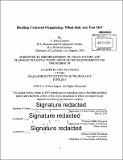Healing centered organizing : what side are you on?
Author(s)
Campos, A. Sofia (Ana Sofia)
DownloadFull printable version (5.592Mb)
Other Contributors
Massachusetts Institute of Technology. Department of Urban Studies and Planning.
Advisor
Phillip Thompson.
Terms of use
Metadata
Show full item recordAbstract
Many youth today grew up with narratives about reaching for the American Dream and working hard to reap the benefits. Yet over 2 million people have been deported under President Obama's administration and over 2 million people live encaged in the U.S., both world records. Millions of youth, especially youth of color, have undergone criminalization, economic crises, and systemic family separation as a result of the American nightmare. This research identifies "healing" as a new priority arena for organizers in movements today. Healing means "to make sound or whole; to restore to health." Social justice organizing is about human relationships, and if we acknowledge hurt people hurt people and healed people can help heal people, we begin to understand the significance of building power with love through healing our individual and collective humanity. Queer, feminist author and activist Audre Lorde said, "Caring for myself is not self-indulgence. It is self-preservation, and that is an act of political warfare." Healing is a political act. My research asks, What does healing look and feel like as an explicit part of youth organizing today? Through my personal organizing and interviews with young organizers, I find accordance with the definitions and significance of healing within organizing. For them, healing is "restoration," "remembrance," and "returning to justice"; and the act of making ourselves and each other whole again by organizing based on love. Healing is "working towards freedom with chosen family." Contemporary youth-led movements are evolving a new organizing approach by melding different traditions including those from Miss Ella Baker, Paulo Freire, and Saul Alinsky. At times, this appears in the form of honoring Baker's legacy or aspiring to practice Freire's pedagogy, while Alinsky's impact is seen in inherited organizational structures. As young organizers implement healing practices central to their movement culture and way of organizing-some more explicitly than others-they struggle to integrate healing work and sustainability into organizational structures. However, this does not deter them from trying, and reminding themselves and each other that, "We on the Freedom Side!"
Description
Thesis: M.C.P., Massachusetts Institute of Technology, Department of Urban Studies and Planning, 2015. Cataloged from PDF version of thesis. Includes bibliographical references (pages 69-70).
Date issued
2015Department
Massachusetts Institute of Technology. Department of Urban Studies and PlanningPublisher
Massachusetts Institute of Technology
Keywords
Urban Studies and Planning.